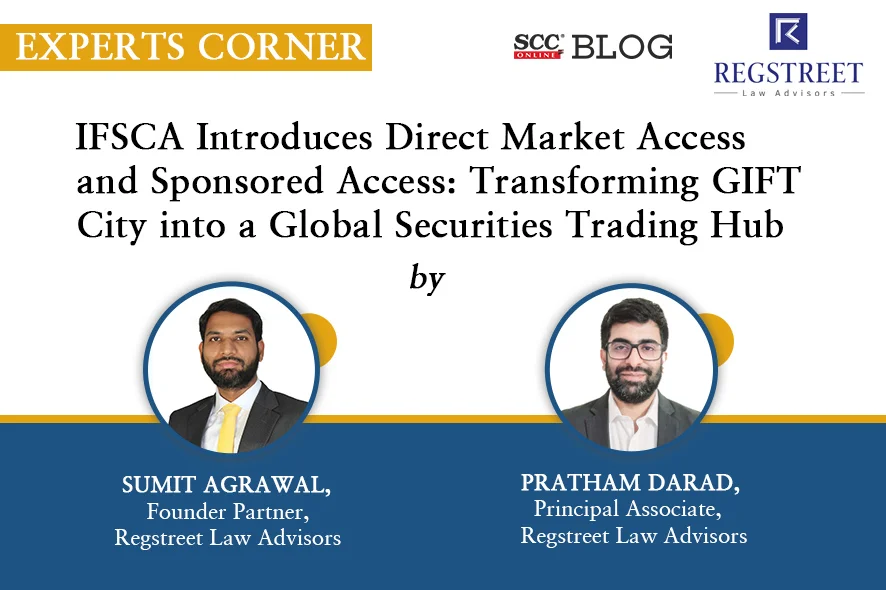Introduction
The International Financial Services Centres Authority (IFSCA) has embarked on a significant and groundbreaking experiment in the securities market that could position Gujarat International Finance Tec-City (GIFT City) as a global hub for securities trading. This initiative may also inspire similar reforms by the Securities and Exchange Board of India (SEBI). IFSCA has introduced two pivotal facilities: direct market access (DMA) and sponsored access (SA). While DMA was initially introduced by SEBI in 2008, it is IFSCA that has now allowed investors access to SA, marking a major milestone in Indian securities trading.
Direct market access and the democratisation of order placement
As stock trading underwent digitisation and shares became dematerialised, stock exchanges replaced physical trading with online terminals for stockbrokers. However, as online trading through stockbrokers became more prevalent, several challenges persisted, including clients’ lack of control over orders, delays in execution due to stockbrokers’ involvement, errors during order placement, and a lack of transparency in trading. To address these issues, regulatory bodies worldwide, including SEBI in India, introduced direct market access.
DMA is a facility that enables stockbrokers to offer their clients direct access to the trading system of the stock exchange, bypassing manual intervention. By utilising the stockbroker’s trading systems, direct access reduces latency and ensures faster trade execution. Moreover, it enhances transparency and minimises the risk of errors inherent in manual order placement. However, DMA is not without its checks and balances. Both SEBI and IFSCA mandate that stockbrokers maintain an audit trail for all DMA orders and trades. Stockbrokers are responsible for implementing systems that can identify the actual user IDs for all DMA transactions.
Before granting DMA access, stockbrokers must ensure that clients fulfil know your customer (KYC) and anti-money laundering (AML) requirements. Creditworthiness, risk-taking ability, and compliance track records are also evaluated. Stockbrokers must be satisfied with the client’s governance and ownership structure and their ability to meet financial obligations. Additionally, stockbrokers and clients must enter into agreements that outline the terms of DMA usage, including restrictions on executing transactions on behalf of other individuals or entities. Clients must agree to abide by the various limits imposed by the stockbroker for DMA usage, and the stockbroker retains the right to withdraw DMA facilities based on predefined thresholds or other concerns instructed by the stock exchange or regulator.
Stockbrokers themselves must implement certain checks before offering DMA facilities to their clients. They need to set trading limits, exposure limits, and position limits for all DMA clients based on risk assessment, credit quality, and available margins. Compliance Officer overseeing compliance or risk-management functions, such as the Chief Risk Officer or Chief Compliance Officer, are responsible for setting these limits. Stockbrokers must ensure that all DMA orders pass through electronic/automated risk-management systems, which validate risk parameters such as quantity limits, price range checks, order value, and credit checks before orders are released to the stock exchange.
Operational flexibility is granted to stock exchanges to establish necessary measures, procedures, and guidelines for DMA orders. These encompass risk management, risk mitigation, technology and systems audit policies, client eligibility for DMA facilities, cybersecurity, cyber resilience, access control, and incident response.
Sponsored access and the decentralisation of order placement
While DMA enables investors to directly access stock exchange trading systems, they are still bound to using the stockbroker’s trading system. This arrangement raises concerns as stockbrokers can potentially gain access to confidential and proprietary trading strategies employed by investors.
To overcome these challenges, sponsored access (SA) has been introduced. SA facilities empower investors to transmit orders directly to the trading system of the stock exchange without routing them through stockbrokers. SA not only maintains the confidentiality of clients’ sophisticated proprietary trading strategies but also reduces latency in trading.
IFSCA is introducing sponsored access in India, a move expected to attract more investors to explore trading opportunities in the derivative segment. However, to ensure risk management and mitigation, orders routed through clients’ trading applications via SA must pass through the pre-trade risk-management layer provided by the stock exchange. Parameters for these risk- management controls are determined and configured by the broker-dealer registered with IFSCA and authorised to provide SA facilities. Before extending the SA facility, broker-dealers must enter into agreements with investors and undertake due diligence. This due diligence includes examining the client’s governance and ownership structure, historical trading patterns and behaviours, anticipated trading volumes, financial obligations, disciplinary history, and responsibilities within the client organisation for dealing with actions and errors. Stock exchanges are responsible for verifying the presence of the agreement between the broker-dealer and the client before approving the SA facility.
To ensure systemic risk mitigation, IFSCA allows clients of broker-dealers to sub-delegate their DMA/SA facilities to their own clients (sub-delegates). This is permitted if the sub-delegating client is an entity regulated by a securities market regulator that is a signatory to the International Organisation of Securities Commissions (IOSCO) multilateral memorandum of understanding (MoU). However, only one level of sub-delegation is allowed, and the broker-dealer permitting sub-delegation must be able to identify the different order flows originating from such sub-delegations.
Conclusion
The introduction of sponsored access by IFSCA is a pivotal development that demands close examination and offers significant learning opportunities. When seamlessly and efficiently implemented, this facility has the potential to position IFSCA as a global securities trading hub and reshape the Indian securities market forever. The democratisation of order placement, increased transparency, and improved risk management will benefit investors and contribute to the growth and evolution of the securities market.
† Founder Partner, Regstreet Law Advisors.
†† Principal Associate, Regstreet Law Advisors







